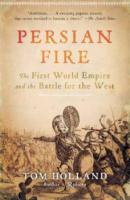
by Tom Holland
A history book – and entertaining from the first to the last page. Written by a historian but by no means dry. It is almost written like a novel, but without the inventions of a historic novel. Holland has a brilliant style to draw you into the story. He uses historical facts and decorates them with circumstances, with descriptions of the culture, possible personal relationships, and interprets them. It is always clear, what is speculation and to what degree the “historical facts” can be trusted. In retrospect I have the feeling that the book uses dialogs. It does not, but Holland’s style evokes this vivid imagination.
By the way, the content stands on its own, a highly interesting topic. It is an account of the Greek-Persian wars around 500 BC. The Persians conquered the first wold empire, which stretched from India to today’s Turkey. They considered the Greek city states of Sparta and Athens as rogue, backwards countries. terrorist countries need to be pacified by submitting them to the benevolent empire. The Persian represent the East, which confronted the West – the Greeks with their own strange culture. At that time the Greeks invented a new form of governance: democracy. Therefore, these wars between the Persians and the Greeks – the East and the West – by many historians and philosophers are considered decisive for the course of humanity. Basically assuming that these first attempts of a new style to run a society could have been crashed by the Persians rules, which were based on absolute and somehow benevolent power of a tyrant. As such, the Romans wouldn’t have adopted the Greek culture but maybe teh Persian culture and these aforementioned principles would not have been passed onto modern Europe (modern means after 1500). In summary, the Persian were more sophisticated and had overwhelming war power but the Greeks resisted in several decisive battles: the first one in Marathon, then Thermopylae, the sea battles at Artemisium and Salamis. The last blow to Persian aspirations in Platea. Holland does not fall into the trap to describe the Persians as the evil as someone would suspect when democracy was at stake. He describes the life on both sides and how it came to that stand-off between the East and the West.
Read it!
By the way, the content stands on its own, a highly interesting topic. It is an account of the Greek-Persian wars around 500 BC. The Persians conquered the first wold empire, which stretched from India to today’s Turkey. They considered the Greek city states of Sparta and Athens as rogue, backwards countries. terrorist countries need to be pacified by submitting them to the benevolent empire. The Persian represent the East, which confronted the West – the Greeks with their own strange culture. At that time the Greeks invented a new form of governance: democracy. Therefore, these wars between the Persians and the Greeks – the East and the West – by many historians and philosophers are considered decisive for the course of humanity. Basically assuming that these first attempts of a new style to run a society could have been crashed by the Persians rules, which were based on absolute and somehow benevolent power of a tyrant. As such, the Romans wouldn’t have adopted the Greek culture but maybe teh Persian culture and these aforementioned principles would not have been passed onto modern Europe (modern means after 1500). In summary, the Persian were more sophisticated and had overwhelming war power but the Greeks resisted in several decisive battles: the first one in Marathon, then Thermopylae, the sea battles at Artemisium and Salamis. The last blow to Persian aspirations in Platea. Holland does not fall into the trap to describe the Persians as the evil as someone would suspect when democracy was at stake. He describes the life on both sides and how it came to that stand-off between the East and the West.
Read it!
Facts:
English title: Persian Fire
Original title: Persian Fire
Published: 2005
